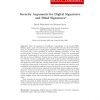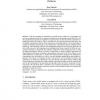21 search results - page 3 / 5 » Adaptive Security in the Threshold Setting: From Cryptosyste... |
JOC
2000
13 years 6 months ago
2000
Abstract. Since the appearance of public-key cryptography in the seminal DiffieHellman paper, many new schemes have been proposed and many have been broken. Thus, the simple fact t...
PKC
2009
Springer
14 years 6 months ago
2009
Springer
We explore the security of blind signatures under aborts where the user or the signer may stop the interactive signature issue protocol prematurely. Several works on blind signatur...
CCS
2005
ACM
13 years 11 months ago
2005
ACM
We describe a new encryption technique that is secure in the standard model against adaptive chosen ciphertext (CCA2) attacks. We base our method on two very efficient Identity-Ba...
JUCS
2010
13 years 4 months ago
2010
: With the spreading of embedded and mobile devices, public-key cryptography has become an important feature for securing communication and protecting personal data. However, the c...
TIFS
2010
13 years 1 months ago
2010
Access control is the fundamental security service in ad hoc groups. It is needed not only to prevent unauthorized entities from joining the group, but also to bootstrap other secu...


